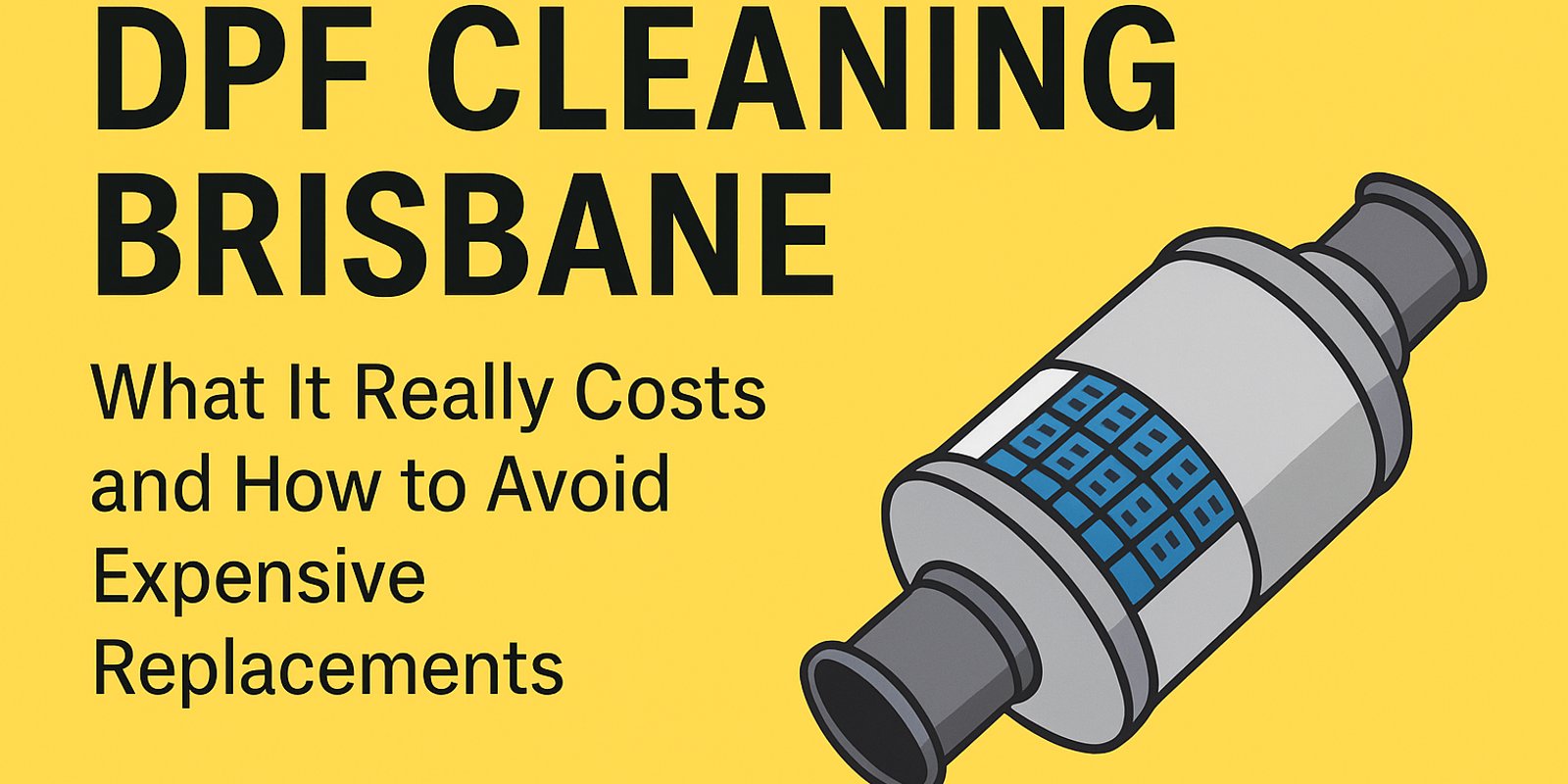DPF Cleaning Brisbane: What It Really Costs and How to Avoid Expensive Replacements
If you drive a diesel vehicle in Brisbane, you’ve likely noticed the rising costs associated with diesel particulate filter (DPF) replacement. As prices continue to climb, many vehicle owners are turning to professional DPF cleaning services as a smarter, more affordable alternative. Understanding what cleaning a DPF involves, when it’s effective, and why a thorough diagnostic is essential can save you thousands of dollars on costly replacements while keeping your vehicle running efficiently and reducing harmful emissions.
What Is a Diesel Particulate Filter (DPF)?
A diesel particulate filter (DPF) is a critical component of your diesel vehicle’s exhaust system designed to capture and store soot and ash particles produced during combustion. This filter helps reduce harmful emissions and maintain compliance with environmental regulations. Over time, the DPF becomes blocked with soot and ash, which can negatively impact engine performance, increase fuel consumption, and cause costly damage if not addressed promptly.
![]()
What Does Cleaning a DPF Involve?
At CleanFlow DPF, we specialise exclusively in on-vehicle chemical cleaning. This method involves applying specialised cleaning fluids directly to the DPF while it remains installed in your vehicle. This approach allows our technicians to monitor live data during the cleaning process, ensuring optimal results and immediate feedback on the filter’s condition. The chemical cleaning breaks down the accumulated soot and ash particles, restoring the filter’s performance without the need for removal.
During the cleaning process, our technicians also inspect related components such as the front pressure sensor, sensor hose, and fuel filter to ensure the entire diesel vehicle’s exhaust system functions properly. This comprehensive approach helps maintain the integrity of regeneration cycles, which are essential for reducing harmful emissions and preventing future blockages. For a professional assessment of your DPF, you can visit CleanFlow DPF Assessment to schedule an evaluation.
Signs You Need Professional DPF Cleaning Services
A blocked DPF can cause several issues that indicate it’s time for professional cleaning or replacement. Common signs include increased fuel consumption, frequent forced regeneration cycles, reduced engine power, and warning lights on your vehicle’s dashboard. In severe cases, vibrations generated by a clogged filter substrate can damage the filter permanently, making cleaning ineffective and necessitating replacement.
Cost Breakdown: How Much Does DPF Cleaning in Brisbane Cost?
The cost of cleaning a DPF varies depending on the severity of the blockage. Professional on-vehicle chemical DPF cleaning services are significantly more affordable than a new DPF replacement, which can be prohibitively expensive. Mobile DPF cleaning services in Brisbane offer the added convenience of coming to your home or workplace, saving you time and the cost of towing.
At CleanFlow DPF, we provide transparent pricing for all our services, which you can easily view by scrolling to the bottom of our website. Our comprehensive cleaning cost typically includes a full diagnostic to assess your filter’s condition, cleaning of related components such as the EGR valve and fuel filter, and the on-vehicle chemical cleaning process. This ensures your diesel vehicle runs efficiently and meets emission standards without the need for costly replacements.
To make the process even easier, you can conveniently book your DPF cleaning service online through the booking section on our website at https://cleanflowdpf.com.au/. This streamlined approach saves you time and ensures your vehicle receives professional care promptly.
How to Prevent DPF Blockages and Save Money
Preventative maintenance is key to extending the life of your DPF and avoiding expensive replacements. Regular highway driving helps maintain natural regeneration cycles, which burn off soot deposits. Additionally, timely maintenance such as checking the pressure sensor, replacing the fuel filter, and using high-quality oil and fuel can reduce soot and ash buildup.
It’s worth noting that Mitsubishi vehicles are particularly prone to DPF faults and do not respond well to stop-start driving conditions. Drivers of Mitsubishi diesel vehicles often encounter the P252F error code, which indicates issues with the diesel particulate filter. This can lead to premature blockages and costly repairs. For more detailed information, here is an article about Mitsubishi DPF problems and how to address them: https://cleanflowdpf.com.au/blog/p252f/.
Avoiding frequent short trips where the engine doesn’t reach optimal temperature is also important. These habits help prevent a blocked DPF and save money on costly cleaning or replacement services.
The Benefits of Mobile DPF Cleaning Services in Brisbane
Mobile diesel service providers in Brisbane specialise in on-vehicle chemical DPF cleaning, delivering expert service at your home or workplace. This approach reduces vehicle downtime, eliminates towing costs, and often lowers overall expenses. Our technicians monitor live data during the cleaning process to ensure thorough restoration of your DPF’s function, helping to reduce harmful emissions effectively.
Technicians also wear safety goggles and follow strict safety protocols to handle hazardous waste generated during the cleaning process, ensuring environmental compliance and personal safety.
Key Service Areas on Brisbane Northside
We proudly offer mobile DPF cleaning services across Brisbane’s Northside, including suburbs such as Chermside, Aspley, Nundah, Stafford, and Virginia. Whether you’re located near the Brisbane Airport precinct or in the northern suburbs like Redcliffe and Sandgate, our expert technicians can come to you, providing convenient and professional DPF cleaning right where you need it.
Conclusion: Why Professional DPF Cleaning Saves You Money
Choosing professional on-vehicle chemical DPF cleaning Brisbane services is a cost-effective alternative to expensive DPF replacement. Expert mobile cleaning not only saves money and time but also extends the life of your diesel particulate filter, maintains vehicle performance, and helps reduce harmful exhaust gases. Don’t wait for costly repairs—book your mobile DPF cleaning service today and keep your diesel vehicle running smoothly while protecting the environment.
For more details or to schedule your service, visit our on-vehicle DPF chemical clean page and discover the benefits of professional DPF maintenance Brisbane.
Frequently Asked Questions (FAQ)
Q: How often should I have my DPF cleaned? A: The frequency depends on your vehicle’s usage and driving conditions. Typically, professional cleaning is recommended every 80,000 to 120,000 kilometers or when signs of blockage appear.
Q: Can I clean the DPF myself? A: While some cleaning methods exist, professional on-vehicle chemical cleaning ensures thorough removal of soot and ash without risking damage to the filter or related components.
Q: What is the difference between DPF cleaning and DPF replacement? A: Cleaning removes accumulated soot and ash to restore filter function, while replacement involves installing a new filter, which is significantly more expensive.
Q: Does cleaning a DPF involve removing it from the vehicle? A: Our on-vehicle chemical cleaning method does not require removal, allowing real-time monitoring and faster service.
Q: What factors affect the cost of DPF cleaning? A: The severity of the blockage, vehicle type, and any additional maintenance needed on related components can influence the total cost.
Q: Will cleaning my DPF improve fuel efficiency? A: Yes, a clean DPF reduces engine strain, which can lower fuel consumption and improve overall vehicle performance.
Q: Is mobile DPF cleaning as effective as workshop cleaning? A: Yes, mobile services use the same professional chemical cleaning methods and equipment, providing convenience without compromising quality.
Q: How long does the DPF cleaning process take? A: Typically, the cleaning process takes a few hours, depending on the condition of the filter and vehicle model.


